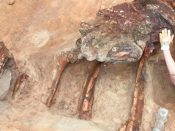Por Richard Camp (Centre for Research into Ecological and Environmental Modelling, University of St Andrews, Scotland & Pacific Island Ecosystems Research Center, U.S. Geological Survey, USA).
Abstract: Hawai'i is the extinction capital of the world, and unfortunately birds are at the forefront of this calamity. We know this because of work by early naturalists and long-term monitoring. In this presentation I will introduce the Hawaiian avifauna, impacts of Polynesian colonization and Western contact, major monitoring efforts, and progress on one area of my PhD research focusing on estimating bird densities from single acoustic recorders accounting for measurement error. We recently developed and demonstrated a protocol to estimate population density from single automatic sound recorders for Hawai'i `amakihi (Chlorodrepanis virens). The protocol uses cue rates from the target species and an estimate of the distance from individuals to a recorder based on the power of the sound. Measurement error in the estimated distances, however, precluded applying the protocol to other bird species. We employ a joint likelihood that integrates a measurement error model with a detection function model to produce unbiased densities of `ōma`o (Myadestes obscurus) from vocalization data collected with measurement error. Incorporating methods to correct for measurement error makes this protocol useful for collecting large scale and long-term information on animal populations, particularly those that are rare or that live in remote areas that are difficult to access.





















